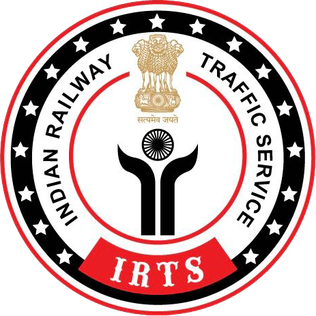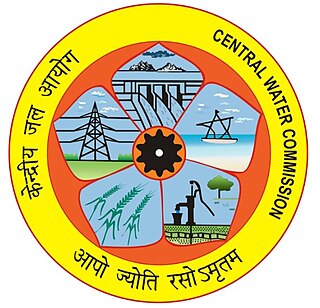
India is the third largest producer of electricity in the world. During the fiscal year (FY) 2021–22, the total electricity generation in the country was 1,719 TWh, of which 1,484 TWh was generated by utilities.

The Electricity Act, 2003 is an Act of the Parliament of India enacted to transform the power sector in India.
The Indian Railway Service of Mechanical Engineering, abbreviated as IRSME, is one of the group 'A' central engineering services of the Indian railways. The officers of this service are responsible for managing the Mechanical Engineering Division of the Indian Railways. Till 2019, IRSME officers were drawn from the Combined Engineering Service Examination (ESE) conducted by Union Public Service Commission. All appointments to the Group 'A' services are made by the president of India.
The Indian Railway Service of Electrical Engineers (IRSEE) is a prestigious group A central engineering services of the Indian railways. The officers of this service are responsible for managing the Electrical Engineering organisation of the Indian Railways.
The Indian Railway Service of Signal Engineers (IRSSE) is a central engineering services group A cadre of the Indian railways. The officers of this service are responsible for managing the Signal and Telecommunications Engineering Organization of the Indian Railways.
The Indian Railways Service of Engineers (IRSE) is one of the oldest group 'A' central engineering services recruited through the engineering services examination of the Union Public Service Commission. The officers of this service are responsible for administering the Civil Engineering organisation of the Indian Railways

The Indian Railway Traffic Service, abbreviated as IRTS is a Prestigious Group 'A' Central Civil Service Cadre of the Government of India. IRTS in its present form was reconstituted in 1967. The IRTS Cadre functions under the Administrative Control of the Ministry of Railways, Government of India. The civil servants under this service are responsible for Operation and Business Development of Indian Railways in the country. On one hand, IRTS officers co-ordinate among various technical departments of the Indian Railways, while on the other hand, they form the public interface of the Indian Railways. Colloquially called Traffic Officers, they are the primary facilitators of Railway services right from Planning of freight movement, Passenger transport, Passenger amenities to Station Management and Infrastructure Planning.
The Central Electricity Authority of India (CEA) advises the government on policy matters and formulates plans for the development of electricity systems. It is a statutory organisation constituted under section 3(1) of Electricity Supply Act 1948, which has been superseded by section 70(1) of the Electricity Act 2003.
The Indian Economic Service is an inter-ministerial and inter-departmental central civil service under Group A of the executive branch of the Government of India. The unique aspect of the service is that the cadre posts are spread across various departments and ministries of central government numbering more than 55. It is a highly specialised and professional service within the government of India catering to economic analysis and policy advice.

Availability Based Tariff (ABT) is a frequency based pricing mechanism applicable in India for unscheduled electric power transactions. The ABT falls under electricity market mechanisms to charge and regulate power to achieve short term and long term network stability as well as incentives and dis-incentives to grid participants against deviations in committed supplies as the case may be.
R.V. Shahi is the Chairman of Energy Infratech Private Limited. He previously served as the Secretary to the Government of India in the Ministry of Power and formerly the Chairman and Managing Director of Bombay Suburban Electric Supply Limited.

National Power Training Institute (NPTI), is a government training institution under Ministry of Power, Government of India with its Corporate Office at Faridabad. NPTI had been providing its dedicated service for more than five decades.
The Indian Telecommunications Service, widely known as ITS, and earlier known as 'Telegraph Engineering Service Class I' is one of the gazetted central engineering services officer under Group 'A' of the executive branch of the Government of India. The appointment to this service is done through Combined Engineering Services Exam held every year by Union Public Service Commission (UPSC) of India. The service was created to meet the technological needs of the government in areas related to telecommunications. The Department of Telecommunications (DOT) had been managed for years by the officers of this permanent cadre, called the Indian Telecommunications Service (ITS).The officers of ITS work under restrictions and rules of Central Engineering Services (Conduct) rules.
Central Electricity Regulatory Commission (CERC), a key regulator of power sector in India, is a statutory body functioning with quasi-judicial status under sec – 76 of the Electricity Act 2003. CERC was initially constituted on 24 July 1998 under the Ministry of Power's Electricity Regulatory Commissions Act, 1998 for rationalization of electricity tariffs, transparent policies regarding subsidies, promotion of efficient and environmentally benign policies, and for matters connected Electricity Tariff regulation. CERC was instituted primarily to regulate the tariff of Power Generating companies owned or controlled by the government of India, and any other generating company which has a composite scheme for power generation and interstate transmission of energy, including tariffs of generating companies.

Grid Controller of India Limited (GRID-INDIA) is a division of the Ministry of Power, Government of India. The new name of Power System Operation Corporation Limited (POSOCO) is Grid Controller of India Limited (Grid-India) since 09th November 2022. It is responsible to monitor and ensure round the clock integrated operation of Indian Power System. It consists of 5 Regional Load Despatch Centres (RLDCs) and the National Load Despatch Centre (NLDC).

NTPC Limited, formerly known as National Thermal Power Corporation, is an Indian central Public Sector Undertaking under the ownership of the Ministry of Power, Government of India which is engaged in generation of electricity and allied activities. The headquarters of the PSU are situated at New Delhi. NTPC's core function is the generation and distribution of electricity to State Electricity Boards in India. The body also undertakes consultancy and turnkey project contracts that involve engineering, project management, construction management, and operation and management of power plants.

The Central Mine Planning and Design Institute is a subsidiary of Coal India Limited which is under the ownership of the Ministry of Coal, Government of India, engaged in the field of environmental engineering and provides consultancy and engineering services across the globe. It is a public sector undertaking under the Government of India and is rated as a Schedule-B and Mini Ratna-II company.
The Indian Statistical Service is a civil service under Group A of the Central Civil Services of the executive branch of the Government of India. ISS is a civil service with high degree of proficiency in Statistical methods and applications. With the main mandate of producing quality Official Statistics with better methods and techniques, provide solutions to the data and information needs and interpretation and analysis of statistics, a majority portion of the probationary training programme is to be devoted to acquiring of technical knowledge in the field of official statistics, economics, financial statistics, survey methodology etc. The posts are recruited through UPSC examination. The minimum eligibility criterion is Bachelor’s degree with Statistics or Mathematical Statistics or Applied Statistics as one of the subject.
The Railway Board Secretariat Service (RBSS) is a central civil service with induction at Group 'B' stage in the Secretariat of the Ministry of Railways of the Union Government of India.

Central Water Commission (CWC) is a premier Technical Organization of India in the field of Water Resources and is presently functioning as an attached office of the Department of Water Resources, River Development and Ganga Rejuvenation, Ministry of Jal Shakti, Government of India. The Commission is entrusted with the general responsibilities of initiating, coordinating and furthering in consultation of the State Governments concerned, schemes for control, conservation and utilization of water resources throughout the country, for purpose of Flood Control, Irrigation, Navigation, Drinking Water Supply and Hydro Power Development. It also undertakes the investigations, construction and execution of any such schemes as required.








